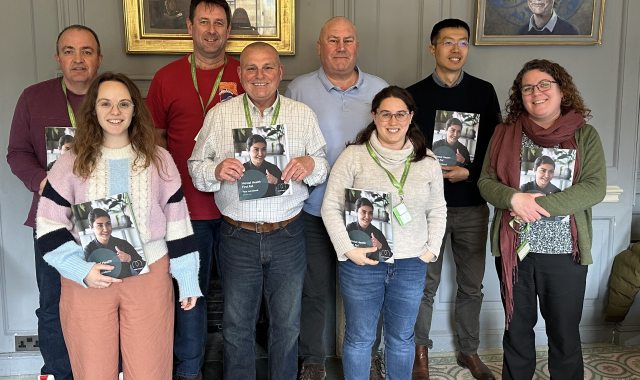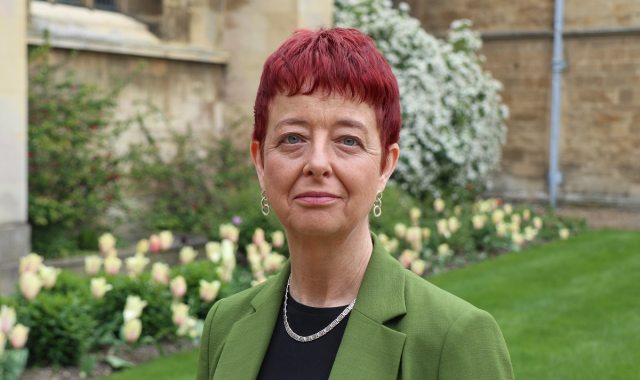Work of former Research Fellow wins John K. Fairbank East Asian History Prize
- 23 October 2019
- 4 minutes
The book of a former Research Fellow, Dr Chris Courtney, written during his time at Caius has won the 2019 John K. Fairbank Prize. The prize, awarded by the American Historical Association, recognises an outstanding book on East Asian History.
Chris’s book The Nature of Disaster in China: The 1931 Yangzi River Flood focuses on the catastrophic flood of the Yangzi in Wuhan that claimed millions of lives through famine and epidemics. His initial interest in the topic was sparked “appropriately enough” by a flood, which destroyed his fieldwork notes and computer. When he shared this story with friends in Wuhan, he was amazed to hear their own stories of flooding in the region. He said, “Older people told me about living as refugees in the hills during a particularly bad disaster in 1954. As I dug through the local libraries and archives, I realised that the flood that occurred in 1931 was of an even greater magnitude.” As Chris read more, he “was amazed that a catastrophe of this scale had been almost entirely forgotten”, not just by the general public but by professional historians. “I was motivated to write, initially, by a sense of injustice; I felt it was wrong that the lives of so many people should so easily be forgotten,” he said. “I also realised that the flood offered a prism through which to view a society struggling to cope with rapid cultural and political change, during the Japanese invasion and Communist insurgency.”
 The Nature of Disaster tells a powerful story in which Chris draws upon long experiences living in China. The insights of friends and family there helped to guide him through the various libraries and archives he used, from Wuhan, to Singapore, to Cambridge. Using the material he gathered, he explains what happened in China in 1931 through six different perspectives: environmental, ecological, religious, sensory, political and social histories. The result is a multi-dimensional analysis of the flood filled with vivid stories: “some tragic, some hopeful and some bizarre” as Chris put it.
The Nature of Disaster tells a powerful story in which Chris draws upon long experiences living in China. The insights of friends and family there helped to guide him through the various libraries and archives he used, from Wuhan, to Singapore, to Cambridge. Using the material he gathered, he explains what happened in China in 1931 through six different perspectives: environmental, ecological, religious, sensory, political and social histories. The result is a multi-dimensional analysis of the flood filled with vivid stories: “some tragic, some hopeful and some bizarre” as Chris put it.
Chris also wanted to offer a historian’s perspective on the field of disaster studies. He said, “This is a field that is dominated by social scientists who have advanced excellent theories for understanding disasters, but often have rather short historical memories. To achieve this, I developed a concept that I describe as the disaster regime. This is basically a way to explain why different kinds of disasters happen at particular historical moments.”
The John K. Fairbank Prize honours Chris’s book as an exceptional work in the field of East Asian History. The book was written during his Research Fellowship at Caius between 2013 and 2017. Chris commented on his time at the College: “There are very few academic institutions nowadays that have the courage to simply leave early career researchers to get on with their work. Caius, by contrast, is practically Daoist in its non-interventionism. That is not to say that there are not always people willing to guide you on your way, supporting ideas or challenging assumptions. I got much of the best advice one could hope for at Caius. Yet the greatest gift the College offered was the time and space to pursue my research without the pressure that bears down upon most early career researchers. The other rare gift that Caius offers its fellows is an intellectual atmosphere that is not constrained by disciplinary boundaries. The ability to interact not just with world-leading historians but with fellows from all other disciplines, undoubtedly broadened the horizons of my own research.”
Now Assistant Professor in Modern Chinese History at Durham University, Chris also commented on the award: “People say that everyone has at least one book in them. What they don’t tell you is that extracting that book can be an extremely tortuous process. Winning the Fairbank’s Prize is helping to convince me that all those sweltering trips to archives and long evenings searching synonyms for the word flood, may have been worth it after all.” He said, “I feel greatly honoured to be included on a list of recipients that also includes a number of my intellectual heroes, many of whose achievements far surpass my own. I hope that winning this prize will educate more people about the 1931 flood, and the many stories of tragedy and endurance that it created.”


